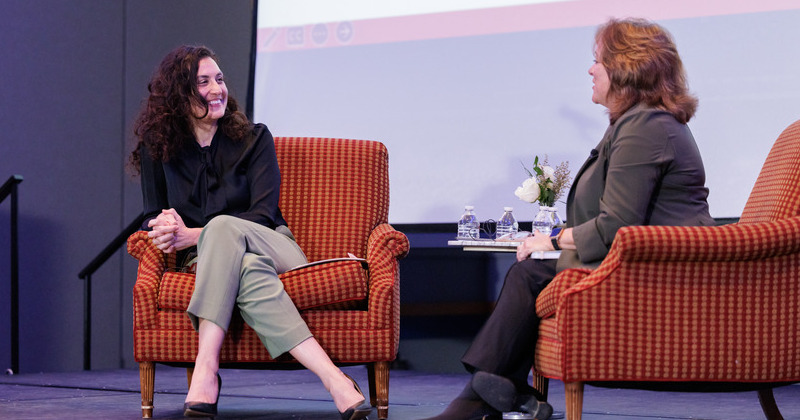


Free speech in the AI era
Photo by Chris Ginn October 20, 2023
PEN America leader speaks at UD and calls for vigilance and accountability in the age of machine learning
The future of free expression in the era of generative artificial intelligence must include increased involvement by U.S. lawmakers and awareness by individuals that what they post on the internet will be used to feed machine learning.
That’s the message PEN America constitutional expert Nadine Farid Johnson told an audience of students, faculty and community members at an event at the University of Delaware on Tuesday, Oct. 17. Hosted by UD’s Department of Communication, “Speech in the Machine: Generative AI’s Implications for Free Expression” was held in honor of National Free Speech Week and as part of a yearlong celebration of the department’s 50th anniversary.
Johnson recounted how tech developer Open AI changed the artificial intelligence landscape when it released its large language chatbot tool ChatGPT last November. Suddenly everyone on the internet had access to a program that could respond quickly and intelligently to questions with human-like text.
The democratization of generative artificial intelligence tools like ChatGPT has sparked widespread concerns about the blurring of lines between fact and fiction. Johnson addressed the benefits and risks during a conversation with moderator Nancy Karibjanian, director of UD’s Center for Political Communication.
According to Johnson, generative AI tools offer creative outlets for artists, support for people with disabilities, access to information and aids for foreign language learning. They also pose risks of exploitation by “bad actors” who peddle misinformation and disinformation.
“AI tools can actually supercharge existing threats to free expression,” Johnson said.
Johnson called for policymakers and corporate leaders to develop policies and guidelines for platform accountability and transparency.
“We’ve talked with Congress about this. We don't have baseline privacy legislation in this country,” she said. "We are giving away everything. We don't know where our data is going. We don't have control over it. We don't know what the platforms know about us.”
As the managing director of PEN America’s Washington, D.C., office, Johnson spearheads the organization’s engagement with the United States government on free expression issues in the U.S. and around the globe. A former intellectual property attorney and U.S. diplomat, Johnson upholds PEN America’s mission to protect free expression, advocate for writers and champion human rights. She co-wrote PEN America’s July 2023 report, “Speech in the Machine: Generative AI’s Implications for Free Expression.”
Johnson expressed concern about misuse by authoritarian governments.
“We are looking at something that at scale could have enormous implications for how we understand history, and how different governments want us to perceive their country's history and the acts that they have undertaken,” Johnson said. “These tools could be wielded or weaponized to manipulate opinions, to skew public discourse, and to influence their users in a way that ultimately is detrimental.”
Technology companies competing in a global market may not prioritize legal and ethical concerns when developing AI systems, Johnson said.
“The language models behind AI chatbots are trained on existing content, so the widespread prevalence of misinformation online makes it unfortunately inevitable that these falsehoods will form part of the data set,” she said.
Johnson emphasized the importance of collaborating with other governments and agencies.
“There needs to be a multilateral framework because the U.S. is not alone,” she said, noting the European Union’s AI Act and the United Kingdom’s white paper on a risk-based approach to regulating AI. “We would also like to see an element in there that is rights-based.“
Johnson advised the audience to remain vigilant and engaged.
“Whether you're using TikTok, or whatever it might be, just be cognizant of what and how you are interacting because you're feeding this stuff every single day. Whatever you are doing, it's being taken, and it's being used,” Johnson said. “And if you are really concerned — as I hope you are — about your privacy online and the use of your data, talk to your member of Congress.”
About the Department of Communication
In 2023-2024, UD’s Department of Communication is celebrating 50 years of researching and teaching about the fundamental and essential role communication plays in daily life. The department is committed to the study and practice of human communication in a wide variety of contexts, including interpersonal communication, media communication and public relations. Beyond the classroom, the department puts student learning into practice through internships, experiential learning on and off campus, and access to a vast alumni network. Learn more on the department's web page.
Contact Us
Have a UDaily story idea?
Contact us at ocm@udel.edu
Members of the press
Contact us at 302-831-NEWS or visit the Media Relations website

